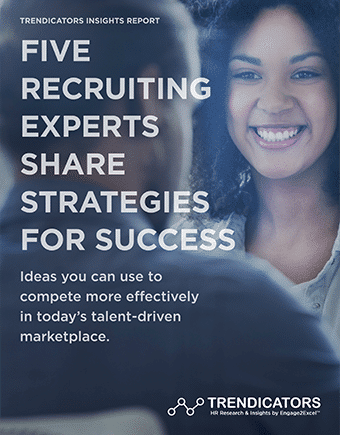Five Recruiting Experts Share Strategies for Success

What are successful recruiters doing to overcome today’s market challenges?
INTRODUCTION
Record low unemployment, a positive economic outlook and a proliferation of recruitment channels make recruiting more challenging today than ever before. To find out what’s working and what isn’t, we interviewed five senior talent advisors, each with a decade or more of experience and a track record of success in several different industry sectors.
Our experts were in complete agreement on the following:
- To be successful, recruiters must function as an advocate for candidates and as a trusted advisor to hiring managers.
- Qualified candidates today are better informed, have more employment opportunities and are less willing to undergo what they perceive as long and drawn out hiring processes.
- In order to compete more effectively for talent, all companies need to reexamine the experiences they are creating for candidates to reduce friction, increase engagement and compress the hiring cycle.
A special thanks to our recruitment experts, Sal Loukos, Duncan Taylor, Jenifer Holljes, Jennifer Krause and Marta Kingsbury for generously sharing their insights and experiences, which have been excerpted on the following pages. Your passion and commitment are truly inspiring.
Trendicators is the research division of Engage2Excel, conducting original research and publishing reports on HR insights and best practices from industry leaders and experts.
Download
 hbspt.cta.load(123973, '622dc513-313d-4399-b69c-d4be668b8cfe', {});
hbspt.cta.load(123973, '622dc513-313d-4399-b69c-d4be668b8cfe', {});
Q: How has recruiting evolved over the course of your career?
Recruiting has evolved a great deal over the last decade. This is due, in part, to the fact that organizations are finally embracing the idea that success depends on your ability to attract and retain talent. The “war for talent” is way overused as an expression, but today it is real due to record low unemployment and acute talent shortages in science, technology, engineering and math.
Q: What skills and abilities do today’s recruiters need to be successful?
Recruiters today have to master many disciplines that are not typically associated with HR. In fact, talent acquisition applies all of the same principles that marketing departments use. Marketing sells products and services. Recruiting sells career opportunities to the people who create and deliver those products and services. I apply the four Ps of the marketing mix to everything I do.
Product: The product I sell isn’t a job role–it’s an experience. At Boston Children’s Hospital, I’m competing with industry for scientists and clinical researchers.
Place: To succeed, I need to have an insider’s understanding of the employee experience, which includes the work itself, the daily environment, the interaction with team members and, most importantly, the opportunities for growth and personal fulfillment
Price: Working for a non-profit hospital means I’m not always going to compete on salary. So, I need to focus on the “product,” or the experience of doing research that can save children’s lives.
Promotion: I need to meet and engage the candidates we are targeting where they congregate. That includes Instagram, where we can bring our value proposition to life with images, and posts from employees, as well as specialized online forums and blogs. Leveraging employees to connect with their communities is critical.
To be successful, I believe recruiters need to become a part of the operational teams they support and, when building a pipeline, they need to treat each prospect or candidate as if they are the only one.

“Successful recruiters follow proven marketing principles. We use research, data and personalized engagement strategies to sell career opportunities to a carefully targeted audience of prospects.”
SAL LOUKOS
Sr. Talent Consultant
Boston Children’s Hospital
Sal Loukos began her recruiting career ten years ago as a sourcing manager first for an RPO provider then for General Motors. It was at IBM that she fell in love with the challenge of owning responsibility for the entire recruiting cycle, from sourcing to placement. At Boston Children’s Hospital, Sal works with the research division, drawing on her skills across sourcing, market research, employment branding, social media and management to support the world’s largest research enterprise at a pediatric hospital.
RECRUITMENT FACT: 89% of recruiters believe that hiring will get more competitive over the next 12 months.
SOURCE: 2017 Recruiter National Report
Download
 hbspt.cta.load(123973, '622dc513-313d-4399-b69c-d4be668b8cfe', {});
hbspt.cta.load(123973, '622dc513-313d-4399-b69c-d4be668b8cfe', {});
Q: How has today’s tight labor market changed the way you work?
It affects everything we do as recruiters. I have always believed in a high-touch strategy with candidates, but today it is absolutely vital. I reach out to every candidate I’m working with once a week, and I return their emails or phone calls within 5 to 10 minutes. If you are highly responsive and manage expectations with candidates, they will tell you where they stand.
Yesterday, a candidate of mine received another offer but told me he was more interested in our position. As a result, I’m working with the hiring manager to speed up the process.
Some hiring managers are in tune with today’s talent market realities. But for many, it’s a bit of an adjustment. Hiring managers need to consider candidates against the job specifications and not against other candidates because of the speed at which the market is moving. While it depends on the role, you often can’t afford to wait for three, four or five candidates and do a comparison to find the best. When you find the candidate that meets the requirements, you have to be prepared to make an offer quickly or risk losing that new hire to another employer.
Q: What role does technology play in helping you be more effective?
We have a proprietary technology platform called Recruiting Machine that I couldn’t live without. Every conversation I have with a candidate or hiring manager is recorded. When I make or receive a phone call, a dialog box pops up and all relevant information is at my fingertips. The system also provides complete transparency for clients, letting them see every call I’ve made and view side-by-side candidate comparisons and notes, tracked in real-time throughout the hiring process. The system also sends an email to candidates to view a job profile or schedule time on my calendar. All of this saves time and enables me to spend more time interacting with candidates and hiring managers to help ensure the right fit.

“I return candidate emails within five to ten minutes and touch base every week. Technology helps me spend more time helping people find more meaningful and fulfilling careers.”
DUNCAN TAYLOR
Senior Recruiter
Engage2Excel Recruitment Solutions
Duncan Taylor believes that he is one of the few people who actively chose a career in recruiting. He came to that choice, however, after working as a medical researcher, having earned his Ph.D. in the study of tropical diseases. Deciding that a life in the laboratory wasn’t for him, Duncan fell in love with recruiting nearly twenty years ago. While he has held several senior management positions over the years, Duncan has found that being a recruiter brings him the greatest personal satisfaction. He says that there’s nothing he’d rather be doing than helping people find meaningful and fulfilling career opportunities.
RECRUITMENT FACT: 48% of job seekers would be willing to take a 10% pay cut to work at a job they’re more interested in and passionate about.
SOURCE: 2017 Job Seeker Nation Report
Download
 hbspt.cta.load(123973, '622dc513-313d-4399-b69c-d4be668b8cfe', {});
hbspt.cta.load(123973, '622dc513-313d-4399-b69c-d4be668b8cfe', {});
Q: As an executive recruiter, what trends are you seeing among candidates?
In my current role, I’m focused on recruiting for mid- and senior-level executives across multiple business functions. One trend that we are seeing on the candidate side is a greater interest in corporate culture, strategic direction and competitive differentiation. Our best prospects are highly valued by their current employers. If they are considering a change, it’s likely because they are not seeing expected opportunities for advancement or growth. As a result, I have to be completely up-to-speed on where the company is headed, and on the internal developments taking place that may motivate a talented executive to consider putting their hat in the ring.
Another trend, which we’ve seen over the past decade, is a notable increase in executives who can’t relocate because they are responsible for aging parents with health problems.
Q. What’s different on the employer side of the equation?
This is where we’ve seen fundamental changes throughout the financial services sector over a relatively short period of time, and it’s very exciting. Org structures are flattening out, titles are less hierarchal, and a high premium is placed on collaborative and analytic skills. While this began taking root in departments that are focused on customer experience and digital service design, these influences are reshaping the enterprise cultures of industry leaders. Key drivers include emerging technologies, which are transforming customer relationships.
Along with digital disruption, however, comes the need for talent and innovation in the areas of compliance and risk management.
Q. How do these changes influence your role as a recruiter?
It’s all about opportunity. When I am putting together a slate of candidates, my ability to convey opportunity for growth with an industry leader is what brings top talent to the table.

“This is an exciting time to be an executive recruiter in the financial services sector. We are seeing fundamental changes in corporate culture and an emphasis on agile, analytic and collaborative skills.”
JENIFER HOLLJES
Executive Recruiter
Mass Mutual
Jenifer Holljes is a senior corporate recruiter with extensive expertise in the financial services sector. She specializes in sourcing for mid- to upper-level roles across multiple business functions. With more than two decades of experience working for industry leaders in banking and insurance, she has consistently demonstrated the ability to recruit talent on a national scale in the areas of finance, accounting, investments, risk, actuarial, marketing, legal and executive management.
RECRUITMENT FACT: 77% of financial services executives believe that emerging technology innovation will play a key role in changing the industry.
SOURCE: Deloitte Insights Report, 2017
Download
 hbspt.cta.load(123973, '622dc513-313d-4399-b69c-d4be668b8cfe', {});
hbspt.cta.load(123973, '622dc513-313d-4399-b69c-d4be668b8cfe', {});
Q: What is “the candidate experience” and how can recruiters improve it?
I see the candidate experience from two vantage points. From the employer perspective, it’s a series of interactions from promoting the opportunity through to screening, application, interviewing, selection and offer acceptance. However, to improve the overall experience, we need to see things from the candidate perspective. We break this journey down into four stages:
Awareness: In today’s market, awareness is often established when a recruiter makes contact with a candidate. If the employer isn’t well known, the recruiter makes the first brand impression. I start by carefully targeting prospects and building a dialogue to understand their current situation. If I try to “sell” an opportunity too soon, I’ll never get to the next stage.
Interest: You can’t develop interest in a position without understanding a prospect’s circumstances or needs. Sometimes there’s a fit for an opening, but often there isn’t. Either way, you want to build a relationship to create interest either as a candidate or as a source for referrals.
Conversion: Hiring managers all too often assume that candidates want the positon they are interviewing for, and overlook the importance of creating an experience that motivates interest in the job, company and career opportunity.
Onboarding: New employees need to be engaged from the time they accept a position, and even before, during the recruiting process, so there is a connection to the organization.
Q: What, in your view, is the biggest mistake that recruiters make?
If you are relying on a traditional job description to market a position today, you’ll run a high risk of failure. It amazes me how often even large employers go to market with uninspired recruitment tools. We have professional writers who develop a comprehensive interactive marketing package for each position that engages candidates and presents a complete picture of the role, the company, the culture and the opportunity for personal and professional fulfillment.

“The candidate experience is vital. I recommend that every recruiter go through the application-to-interview process
once a year to identify opportunities for improvement.”
JENNIFER KRAUSE
Senior Recruiter
Engage2Excel Recruitment Solutions
Based in Southern California, Jennifer Krause has a passion for recruiting that is contagious. Spanning more than two decades, her career includes corporate recruiting roles in outsourcing, technology and education. Jennifer was so impressed by the company that recruited her for a position at an education company that she joined the team several years later as a senior recruiter.
RECRUITMENT FACT: 81% of millennials believe that recognition during the pre-hire process is either Important or
Very Important.
SOURCE: 2017 Engage2Excel Trendicators Report
Download
 hbspt.cta.load(123973, '622dc513-313d-4399-b69c-d4be668b8cfe', {});
hbspt.cta.load(123973, '622dc513-313d-4399-b69c-d4be668b8cfe', {});
Q: What advice do you have for people that are getting started in recruiting?
To be successful as a recruiter, you have to treat every prospect or candidate with dignity and respect. That may sound obvious, but people often say they feel like recruiting is a black hole. They say things like, “I applied for the job but never heard anything back.” Failure to follow-up is a negative brand impression for your company and for you personally. The other side of this is that every prospect is a referral source as well as a potential candidate down the road. When you take the time to learn what motivates a candidate, to recognize their achievements and understand what they are looking for, you’re building a relationship that extends well beyond your current list of open reqs. I consistently get some of my best candidates as referrals from people I’ve never hired.
Treating people with respect also means being truthful. Overselling a position always backfires. You need to spend the time with hiring managers and coworkers to understand the pros and cons of each position. Good recruiters are career advisors for their candidates. Finding the right fit saves you from having to fill the role six months to a year later.
Q: How can recruiters be better strategic partners for the business?
We need to move from filling reqs to building talent pipelines. Even large companies sometimes have difficulty in adopting proactive strategies for talent acquisition. Be at the table with your managers when they are doing their yearly planning. Help hiring managers think through their “must haves” and set realistic expectations based on current market data. Building a pipeline takes time, but we can’t blame the business for not understanding how important this is.
Q: How do you measure your success?
We look at time-to-fill and offer acceptance rates, but the key metric for recruiting success is, ”how successful are our new employees in their roles?” Tracking this is the only way you can become a better recruiter.

“If I could only share one piece of advice with a new recruiter it would be this: treat every candidate with the same respect and dignity you’d like to receive on your next job search.”
MARTA KINGSBURY
Corporate Recruiter
Development Group, Inc. (DGI)
Marta Kingsbury began her career in recruiting at Netscape, which once dominated the web browser market. Having found her passion in technology, she went on to senior roles at BrassRing and then IBM. Today, Marta owns the recruiting function as part of a two-person HR team at DGI, a company that provides technology integration solutions for schools, universities and municipalities.
RECRUITMENT FACT: Lack of recognition, appreciation or respect: The top reason cited by 18-44 year-olds for leaving their current employment arrangement.
SOURCE: 2017 Engage2Excel Trendicators Report
Download
 hbspt.cta.load(123973, '622dc513-313d-4399-b69c-d4be668b8cfe', {});
hbspt.cta.load(123973, '622dc513-313d-4399-b69c-d4be668b8cfe', {});